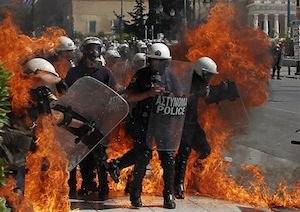Austerity Deal Sparks Massive Greek Anger
Up to 200,000 Greeks took to the streets Wednesday during a general strike that paralyzed the country, marking the public’s first major confrontation with Athens’ 3-month-old coalition government.
Up to 200,000 Greeks took to the streets Wednesday during a general strike that paralyzed the country, marking the public’s first major confrontation with Athens’ 3-month-old coalition government.
Strikers are opposing $15.3 billion in wage and pension cuts over the next two years, which the government says is necessary for the country to remain eligible for further rescue funds from international lenders.
Police and members of the navy, army and judicial system joined protesters from the public and private sector. One unnamed cop said the government “should feel deep shame” for imposing cuts on the people it employs for protection.
“This is a warning to the government not to pass the measures,” said Ilias Iliopoulos of ADEDY, the union of civil servants, to The Guardian. “Today was a huge success as witnessed by all those in the armed forces and police who also participated because they, too, will be affected by these cuts. The government must know that if it wants to push us further into a corner, we will react.”
Many Greeks say that elected officials are not handling the financial crisis in the manner in which they were hired to do. “These parties were given our vote back in June because they promised to renegotiate the terms of the loan agreement,” said Penelope Angelou, an unemployed mother. Angelous was referring to punishing conditions of the bailout agreement Athens signed with creditors at the EU, ECB and IMF earlier this year. Prime Minister Antonis Samaras is expected to endorse the package Thursday; it will be sent to parliament for ratification soon after.
“We are all tired,” she said. “This is the third year of nonstop cuts and tax increases, which have made us poor and divided us as a society. And they have not solved our problem. The recession is going from bad to worse.”
An austerity economy has pummeled Greeks since the outbreak of Europe’s debt crisis in 2009. Much of the public has seen its purchasing power drop by 50 percent as poverty and joblessness soared everywhere around them.
Government officials have failed to convince the public that the cuts they have prescribed are necessary. The $40.5 billion loan from the “troika” of creditors is available only if the government takes steps to assure lenders it will one day return that money. Leaders see austerity cuts as the best way to keep that promise. But that will depend on whether the government survives.
— Posted by Alexander Reed Kelly.
Your support matters…The Guardian:
Once endorsed, the package will be sent to the parliament for ratification, probably next week. But the government’s highwire act of trying to placate lenders while ensuring that the nation is not pushed over the edge will not be easy. Polls have shown the vast majority of Greeks see the measures as deeply unfair and antisocial. Highlighting fears that the recession-inducing policies have pushed Greece into an economic death spiral, the ratings agency Fitch declared Wednesday that far from being reduced, Athens’ debt mountain was growing, with the country’s debt-to-GDP ratio set to increase from its current 164.9% to 180.2% in 2014.
“Once the Greek people learn exactly what the measures are, there will be uproar,” Iliopoulos, the trade unionist, told the Guardian. “Parliament will see mass protests. And it won’t be nice.”
Independent journalism is under threat and overshadowed by heavily funded mainstream media.
You can help level the playing field. Become a member.
Your tax-deductible contribution keeps us digging beneath the headlines to give you thought-provoking, investigative reporting and analysis that unearths what's really happening- without compromise.
Give today to support our courageous, independent journalists.






You need to be a supporter to comment.
There are currently no responses to this article.
Be the first to respond.